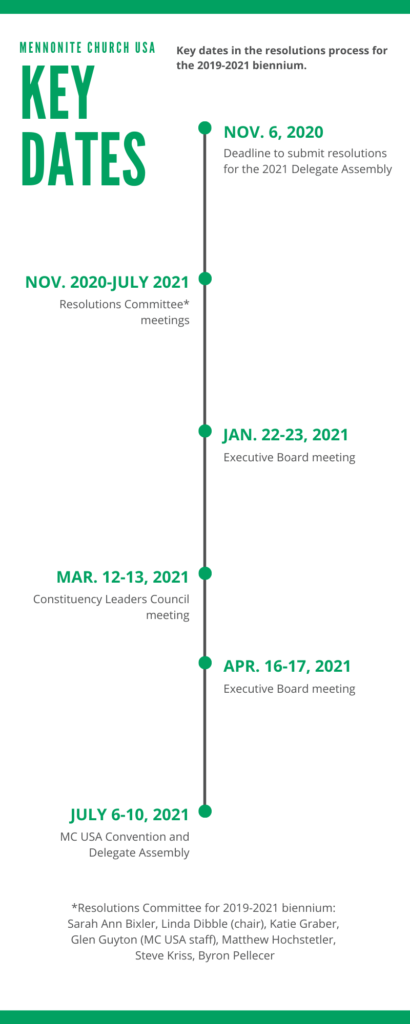
Glen Guyton is the executive director of Mennonite Church USA
_______________
There is often a lot of anxiety when it comes to preparing for our biennial Delegate Assembly. Of course, this anxiety is related to the potential resolutions. And yes, our processes have not always been easy to follow nor our leadership transparent, but we hope to journey forward better. The general sense is that the Executive Board of Mennonite Church USA (MC USA) controls the process and controls the delegate body’s resolutions. In reality, one of the benefits of being a member of MC USA is that we can give input into the resolution process and help shape our denomination. The Delegate Assembly of MC USA gets the final vote. But before that vote occurs, the members of MC USA are encouraged to exercise their ability to speak into the resolution process. Members have up until 240 days before the Delegate Assembly to get their voices heard in our system. Even after that time, MC USA, as a collective body and not just the Executive Board, has a broad array of checks and balances in place before a resolution ever hits the delegate floor.
I encourage every member, congregation, conference, and leader in MC USA to know their rights and privileges related to shaping who we are as a national body.
The first step is reading our Bylaws of Mennonite Church USA, which spells out our organizational structure and the authority housed at each level of the church. The Executive Board does not have the ultimate authority in our system. Power and authority are well dispersed throughout our system. Secondly, become familiar with Guidelines for Developing Resolutions for Mennonite Church USA. Did you know that any conference, congregation, or constituency group can submit a resolution for consideration? Yes, it is true. Your voice and values can be shared, whether you consider yourself progressive, conservative, traditional, or something else. I often get letters from people complaining about an Executive Board or staff decision. I wonder why more people don’t take advantage of the power and authority allotted to them in our system and submit a resolution for consideration.
Let’s be the church together. We need each other, and we need to hear each other, discerning together.
Below is a summary of the power granted to each level of our denomination when developing resolutions. Please refer to the official documents for the approved full process. I hope this summary helps us see our role and responsibility in shaping Mennonite Church USA. I also hope we take our roles seriously, whether we are working at the congregational level, the conference level, or the denominational level. We must be proactive and accountable in living into our shared identity as MC USA.
 The Powers Granted to the Executive Director
The Powers Granted to the Executive Director
- Receives resolutions from the members of MC USA.
- Facilitates the administration of the resolution process.
- Facilitates the education process related to resolutions.
The Powers Granted to the Executive Board
- At any time before the conclusion of a Delegate Assembly, the Executive Board may each propose one or more resolutions for action by the Delegate Assembly.
- Appoints the Resolutions Committee.
- Can veto any resolution submitted after the 240-day window.
The Powers Granted to the Resolutions Committee
- At any time before the conclusion of a Delegate Assembly, the Resolutions Committee may propose one or more resolutions for action by the Delegate Assembly.
- Receives resolutions for consideration.
- May meet with authors of resolutions for clarity or suggestions for rewrites.
- Following CLC feedback, edit, amend, modify and restate any proposed resolution (except those proposed by the Executive Board).
- The Resolutions Committee may not prevent a resolution submitted by the Executive Board from being submitted to a Delegate Assembly.
- Give counsel to the Executive Board and determine whether a proposed resolution is rejected or has sufficient churchwide support, impact and interest such that the Constituency Leaders Council (CLC) should spend time discerning whether it should be submitted to the Delegate Assembly.
The Powers Granted to Constituency Leaders Council (CLC)
- Engage in corporate discernment regarding the resolution’s suitability for consideration by the Delegate Assembly.
- Recommend an appropriate percentage of delegates needed to adopt the resolution.
- Recommend the degree to which a proposed resolution is intended to be binding on area conferences and congregations of MC USA.
- State any other considerations for the Resolutions Committee to consider before sending a resolution to the Delegate Assembly.
- The CLC may discern that any proposed resolution requires more time for discernment and recommend such resolution for later disposition.
- CLC may not prevent a resolution submitted by the Executive Board from being forwarded to the Delegate Assembly.
The Powers Granted to the Members of MC USA
- Area conferences, congregations and constituency groups may propose a resolution for action by the Delegate Assembly.
- Conferences assign members to participate in the CLC.
- Through their representatives (delegates) to the Delegate Assembly, conferences and congregations participate in Mennonite Church USA’s planning and decision-making.
The Powers Granted to the Delegate Assembly
- Discuss and decide major issues of policy for the national conference and the development of programs to carry out those policies.
- Discern the voice and the Spirit in the midst of the Delegate Assembly.
- Provide an opportunity to speak to the establishment of general policies.
- Confirm various MC USA leaders.
After a resolution has been approved for the Delegate Assembly, the process still allows MC USA members to speak into the process.
- Proposed resolutions approved by the CLC may be posted on the Mennonite Church USA website or printed for distribution.
- Proposed resolutions may be promoted by the writers/sponsors via blogs or opinion pieces as appropriate.
- The constituency may provide feedback to proposed resolutions via email or postal mail to the Executive Director, CLC, Executive Board, or the Resolutions Committee.
I trust that this blog post will enable MC USA members to be more faithful in our corporate pursuit of God’s mission in the world. We are committed to open and ongoing communication. Make sure you subscribe to PeaceMail so that you don’t miss any of the important information the denomination has to share.
You have a voice in MC USA. Please, use it.
Don’t let the perceptions of the past hold you back from engaging in the Delegate Assembly process. Be proactive, know your rights and let us embrace a new way of living into our commitments as members and leaders in MC USA, who love and follow Jesus.

